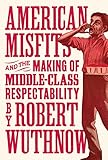American Misfits and the Making of Middle-Class Respectability / Robert Wuthnow.
Material type: TextPublisher: Princeton, NJ : Princeton University Press, [2017]Copyright date: ©2017Description: 1 online resource (352 p.) : 24 halftonesContent type:
TextPublisher: Princeton, NJ : Princeton University Press, [2017]Copyright date: ©2017Description: 1 online resource (352 p.) : 24 halftonesContent type: - 9780691176864
- 9781400888092
- Group identity -- United States -- History
- Middle class -- History
- Middle class -- United States -- History
- Social ethics -- United States -- History
- Social stratification -- United States -- History
- RELIGION / Comparative Religion
- American Dream
- American culture
- American middle class
- American politics
- American religion
- childen's literature
- congregations
- emotion
- emotional displays
- hucksters
- immigrants
- immigration
- insane
- insanity
- mentally ill
- middle class respectability
- middle class
- misfits
- naughty children
- negative examples
- nineteenth century
- nineteenth-century America
- othering
- peddlers
- profiteering
- profiteers
- religion
- respect
- respectability
- social interaction
- social life
- zealotry
- zealots
- 305.50973 23
- HN90.M3
- online - DeGruyter
- Issued also in print.
| Item type | Current library | Call number | URL | Status | Notes | Barcode | |
|---|---|---|---|---|---|---|---|
 eBook
eBook
|
Biblioteca "Angelicum" Pont. Univ. S.Tommaso d'Aquino Nuvola online | online - DeGruyter (Browse shelf(Opens below)) | Online access | Not for loan (Accesso limitato) | Accesso per gli utenti autorizzati / Access for authorized users | (dgr)9781400888092 |
Browsing Biblioteca "Angelicum" Pont. Univ. S.Tommaso d'Aquino shelves, Shelving location: Nuvola online Close shelf browser (Hides shelf browser)

|

|

|

|

|

|

|
||
| online - DeGruyter Safeguarding Democratic Capitalism : U.S. Foreign Policy and National Security, 1920-2015 / | online - DeGruyter How to Do Things with International Law / | online - DeGruyter Implausible Dream : The World-Class University and Repurposing Higher Education / | online - DeGruyter American Misfits and the Making of Middle-Class Respectability / | online - DeGruyter Dilemmas of Inclusion : Muslims in European Politics / | online - DeGruyter Multimethod Research, Causal Mechanisms, and Case Studies : An Integrated Approach / | online - DeGruyter Engineers of Jihad : The Curious Connection between Violent Extremism and Education / |
Frontmatter -- CONTENTS -- ILLUSTRATIONS -- Introduction -- CHAPTER 1. A Relational Approach: The Social Construction of Respect and Respectability -- CHAPTER 2. Worked as a Huckster: Moral Connotations of Placeless Labor -- CHAPTER 3. An Incurable Lunatic: Pension Politics in the Struggle for Respectability -- CHAPTER 4. Not a Fanatic: Zeal in the Cause of Zion -- CHAPTER 5. Dying Young: Immigrant Congregations as Moral Communities -- CHAPTER 6. Excessive Profits: Wealth, Morality, and the Common People -- CHAPTER 7. Naughty Children: Moral Instruction by Negative Example -- CHAPTER 8. Othering: Cultural Diversity and Symbolic Boundaries -- Notes -- Selected Bibliography -- Index
restricted access online access with authorization star
http://purl.org/coar/access_right/c_16ec
How American respectability has been built by maligning those who don't make the gradeHow did Americans come to think of themselves as respectable members of the middle class? Was it just by earning a decent living? Or did it require something more? And if it did, what can we learn that may still apply?The quest for middle-class respectability in nineteenth-century America is usually described as a process of inculcating positive values such as honesty, hard work, independence, and cultural refinement. But clergy, educators, and community leaders also defined respectability negatively, by maligning individuals and groups-"misfits"-who deviated from accepted norms.Robert Wuthnow argues that respectability is constructed by "othering" people who do not fit into easily recognizable, socially approved categories. He demonstrates this through an in-depth examination of a wide variety of individuals and groups that became objects of derision. We meet a disabled Civil War veteran who worked as a huckster on the edges of the frontier, the wife of a lunatic who raised her family while her husband was institutionalized, an immigrant religious community accused of sedition, and a wealthy scion charged with profiteering.Unlike respected Americans who marched confidently toward worldly and heavenly success, such misfits were usually ignored in paeans about the nation. But they played an important part in the cultural work that made America, and their story is essential for understanding the "othering" that remains so much a part of American culture and politics today.
Issued also in print.
Mode of access: Internet via World Wide Web.
In English.
Description based on online resource; title from PDF title page (publisher's Web site, viewed 29. Jul 2021)


